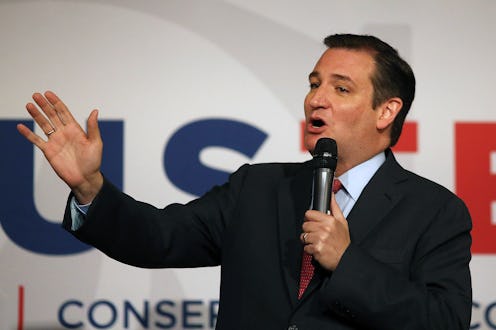News
Cruz’s Muslim Patrolling Plan Wouldn't Even Work
Early Tuesday morning, three explosions killed dozens of people in Brussels and sent the world into a state of terror and mourning. So, Republican presidential hopeful Ted Cruz's natural response was to make a campaign pitch and then issue a statement calling on America “to empower law enforcement to patrol and secure Muslim neighborhoods before they become radicalized." In short, Cruz called for questionably-legal surveillance of Muslim Americans. Not only do I find such a plan unethical and revolting in how it plays to people's worst fears, it probably wouldn't work.
The thing is, Ted, we’ve been there, done that — and keeping a watchful eye on certain demographic groups, whether or not they are or are even affiliated with actual terrorists, is simply not an effective (or necessarily Constitutional) strategy.
As chairman of the National Black Police Association (NBPA) Malik Aziz tells Bustle, “Police are already empowered to patrol and secure all neighborhoods, but our best tool is called community policing and community engagement. It is the best way to break down barriers and get to know the community and help prevent illegal acts of any manner.” Keith Vona, attorney and former police officer, agrees. Vona tells Bustle that, "from a logistics standpoint [what Cruz suggested] could be done." However, he notes that any information gathered would be pretty useless, explaining:
Unless they change the law, you’re not going to be able to effectively do it. As a police officer, you have to work within the confines of the law. Ultimately you don’t want to gather evidence that’s going to be thrown out in court. You can’t just target an ethnicity; that's not only unconstitutional but morally wrong. There are plenty of law-abiding citizens of the Muslim faith.
In practice, though, the police in certain parts of the United States have already been paying special attention to Muslims for years — and it doesn't seem all that fruitful.
Earlier this year, a settlement was announced in a lawsuit filed by the American Civil Liberties Union (ACLU) and other groups to challenge a surveillance program the New York Police Department (NYPD) implemented in the mid-2000s to track Muslims. In a recent CBS appearance, Cruz singled out the NYPD program for praise. Surveillance of Muslims, he said, was akin to police strategies designed to combat gang violence, and African-Americans, Latinos, and Muslims should be grateful for a “serious police presence” in their neighborhoods.
According to the ACLU's lawsuit, the NYPD monitored Muslim communities and institutions for years, by, among other things, sending officers and informants to stake out places of worship. A 2012 AP article about the program asserted that over six years of police spying on Muslims — including determining where individuals who had committed no crime lived, congregated, and prayed, as well as investigating whether or not they’d adopted Americanized surnames — never yielded a lead or triggered a terrorism investigation.
How did the AP learn that the NYPD’s now-defunct spying program was a failure? From the unsealed court testimony of an NYPD police officer who helped run it. When pressed by a CBS anchor to acknowledge that the program didn’t work, Cruz said, “It is true that the DeBlasio political henchmen say that. It’s also true that the NYPD said it provided valuable intelligence.” I don’t know which NYPD officers Cruz has spoken with, but I guess it wasn’t the one who admitted in a deposition that the program was highly invasive and completely useless.
Hina Shamsi, who worked on the ACLU's lawsuit and directs the organization’s National Security Project, sees Cruz’s remarks as cause for alarm. “Religious freedom and equal protection are two of the fundamental rights our founders enshrined in the constitution for very important reasons,” Shamhi tells Bustle. “Sadly, it’s not new for politicians to use prejudice and fear for political gain, but it is dangerous and divisive."
It's also not allowed under the U.S. Constitution, Shamsi explains. "The fundamental issue here of profiling people based on their religion is unconstitutional," she says, adding:
Calling for law enforcement to monitor communities based on their faith is un-American. This is not who we are as a country. No one should be trying to divide Americans on the basis of how we choose to pray or if we choose to pray. Proposals like [Cruz’s] send a message that some people in this country are second-class citizens and that is profoundly antithetical to the values we espouse and the kind of country we want and should have.
Shamsi urges me to consider how Cruz’s proposal would sound if the word “Muslim” were replaced with “Christian,” “Jewish,” “African-American,” or “Latino.”
“What’s wrong in one context is wrong in this context as well,” she says. “Assigning collective responsibility for the bad acts of a few to an entire group of people is the essence of bigotry.”
Mark Sidel, professor of law and public affairs at the University of Wisconsin-Madison and author of More Secure, Less Free? Antiterrorism Policy and Civil Liberties after September 11, doesn’t think much of Cruz’s suggestion, either. “Cruz’s comment reflects bad values, it’s unrealistic, and it’s economically and practically unfeasible,” he tells Bustle. “Selecting certain groups’ neighborhoods for special ‘patrol’ and to ‘secure’ is antithetical to our values and our aspirations as a nation.”
Even New York City Police Commissioner William J. Bratton — hardly a bleeding-heart liberal — slammed Ted Cruz, telling CBS on Wednesday that the Texas senator “doesn’t know what the hell he’s talking about.”
Bratton and I may not see eye-to-eye on everything, but at least we agree that Ted Cruz’s strategy to combat terrorism is as ineffective as it is wrong.
